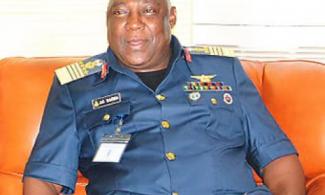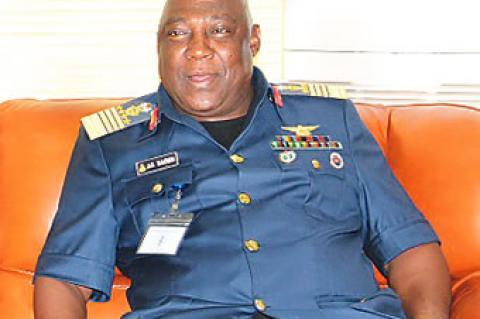
Badeh is being prosecuted by the EFCC before Justice Okon Abang of the Federal High Court in Maitama, Abuja
An attempt by a prosecution witness to distort facts in the ongoing trial of a former Chief of Defence Staff (CDS), Air Chief Marshal Alex S. Badeh (rtd) was on January 10, 2017 exposed by counsel to the Economic and Financial Crimes Commission, EFCC, Rotimi Jacobs, SAN.
Badeh is being prosecuted by the EFCC before Justice Okon Abang of the Federal High Court in Maitama, Abuja. He is standing trial alongside a firm, Iyalikam Nigeria Limited, on a 10-count charge bordering on money laundering, criminal breach of trust and corruption to the tune of N3.97billion.
He allegedly abused his office as CDS by using the dollar equivalent of the sum of N1.4billion removed from the accounts of the Nigerian Air Force to purchase properties in choice areas of Abuja between January and December, 2013. The offence contravenes Section 15 (2) (d) of the Money Laundering (Prohibition) Act, 2011 (as amended) and punishable under Section 15(3) of the same Act.
The witness, Joseph Okpetu, who testified as PW13, told the court that he received hundreds of millions of naira from Badeh for various construction projects. Okpetu, a builder and Managing Director of Habco Nigeria Limited, Kunychun Drilling Services and Dilplast Nigeria Limited, narrated how he was contracted to build a 3-bedroom duplex in Yola valued at N150million for Badeh; renovate Badeh’s country home at Mubi, Bintin in Gwoza local government area of Adamawa State at the cost of N50million; paint one of Badeh’s homes in Zone B, Abuja amongst other renovations, and purchase plants and equipment for a farm belonging to the former defence chief.
He said: “Yushau (former Director of Finance and Accounts of the Nigeria Air Force during Badeh’s tenure) had called me to his official residence and showed me a drawing of a building to be constructed in Yola for his boss, Badeh. Initially, the quote was N200million but after scaling down some of the features of the house, the price came down to N150million.
“At the meeting, Yushau gave me the dollar equivalent of N50million as mobilization. The other payments were done later in two installments. During construction, Badeh visited the house on two occasions (with Yushau) and there were no complaints.”
The drawing in respect for the Yola duplex was tendered and marked as Exhibit T88. Confusion however started when the witness began to contradict the statement he had earlier volunteered to the EFCC.
Sensing a foul play, counsel to EFCC, Rotimi Jacobs swiftly drew Okpetu’s attention to the contradictions, asking the witness if he still stood by what he had said in his earlier statements.
“I do not stand by my statement to the EFCC”, Okpetu replied. Upon further examination by Jacobs, Okpetu admitted that the counsel to the second defendant (Iyalikam), Samuel Zibiri, SAN, who was holding brief for S. T. Ologoorisha, was in fact, his close family friend.
“On the first day that I was arrested by the EFCC, Zibiri, came to bail me. Like me, he is from Edo State. We are family friends”, he confessed.
At this point, Justice Abang adjourned to Thursday, January 12, 2017 for continuation of trial.
Also a prosecution witness, Fatima Daku, on November 17 told a Federal High Court, Maitama, Abuja, that the various sums of money, which she credited into the “Visa Gold Account” of a former Chief of Defence Staff, Air Chief Marshal Alex Badeh, were brought to the bank by Badeh’s ADC and orderly.
Daku had on November 14, 2016 told the trial judge that she opened the account for Badeh between 2012 and 2013 was subsequently credited with about $752,000. The account, according to her, could not be operated over the counter except in case of cash deposits.
While being led in evidence by prosecuting counsel, Rotimi Jacobs, SAN, she told the court that Badeh’s ADC, Tom Gani, and his orderly, whose name she didn’t know, were the ones that usually bring the dollar cash to her at the bank for onward payment into Badeh’s account.
“I can’t remember the name of the orderly, but I always handed over the customer’s copy of the deposit slip to them, and kept that of the bank,” she said. She further told the court then that upon a request from the EFCC in May, indicating that Badeh was under investigation, the Internal Audit of the bank furnished the anti-graft agency with the requested documents relating to the account, including certificate of identification, vouchers, statement of account and other relevant documents.
The document was subsequently admitted in evidence as G1 – G14.Defence counsel, Akin Olujinmi (SAN), who took time to go through the various tellers in the exhibits, noted that the name of Badeh was not on the tellers, but instead, they had the name of Daku on them, with the exception of one or two, which had “self” written at the space for depositor’s name.
Taking her up on the tellers, Olujinmi alluded to the fact that “self” implied the person who was filling the teller, which in the instance was the banker. He argued that the said cash deposits could not be directly linked to Badeh. Daku, under re-examination by Jacobs, was asked to make clarification on why she put her name on some of the tellers and “self” on others.
The question was objected to by Olujinmi, who argued that “re-examination was not meant to be an opportunity for the prosecution to recoup.”
Quoting from Section 215 of the > Evidence Act, Jacobs, however, insisted that the question was in order, as long as it is to enable the witness make clarifications to comments made during cross-examination.Justice Abang, after listening to both arguments, overruled Olujinmi’s objection, ruling that a witness under re-examination, can be allowed to make clarification about statements made earlier, noting that the account name was Alex Badeh, though Daku’s name was on some of the tellers, and “self” was on others.
Daku, however, explained that self meant owner of the bank account, adding that: “As relationship manager, I filled in the teller of June 13, 2013 for the payment of the $50,000 in the account, and credited it with the money, but the two officers were the ones that brought the money.”She explained further that though several of the tellers had her name, and Badeh never came personally to make the deposits, “the money did not belong to me, and they were brought to the bank by the two officers”.
